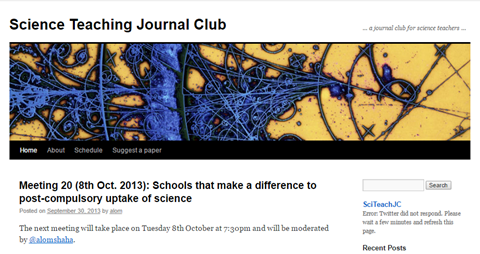Science teaching journal club and relating research to practice
Science teaching journal club (@SciTeachJC)
A new virtual network of science teachers, organised by two London-based science teachers and hosted on Twitter was launched recently. A challenge facing teachers is how to access and apply the latest research findings to their own teaching, as time to participate in part-time courses and meet other teachers is limited.
Alom Shaha and Alby Reid have found a way via social media to help teachers achieve this through the Science Journal Teaching Club.

Justin Dillon, professor of science and environmental education at King's College London, chose a paper for discussion and reported his experiences gathered from 400 tweets generated in an hour by the 67 participants, in the Guardian blog.
He said that the responses to his paper were 'hugely encouraging' and 'it looked like good professional development. People followed through ideas, shared thoughts and questions and listened to what others had to say.'
You can participate by logging on to SciTech on Twitter at 19:30 (UK time), every other Tuesday using the #SciTeachJC hashtag.
Relating research to practice in informal learning environments
There is a growing body of knowledge about teaching and learning in informal learning environments such as museums, after-school programs, and home settings. However most educational research still takes place in classrooms, and much of it is not made easily accessible to informal educators. The aim of the new research2practice website is to make at least some of this large body of knowledge about teaching and learning (mostly papers published over the last two years) accessible to informal educators.
The website contains a set of briefs summarising recent peer-reviewed educational research. These are written with the interests, needs, and institutional settings of informal science educators in mind. The goal is that they will be used to inform discussion, reflection, and practice, and that some readers might choose to link to and download the original articles.
The website itself is a research project and its researchers are asking the questions 'can current peer-reviewed educational research be made available, accessible, and useful to informal science educators? Can it be used to inform practice?'
You can participate in the study by providing feedback about the idea, format and content of the site. Click the 'Register to Participate' button on the website.






No comments yet